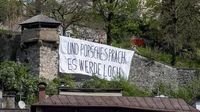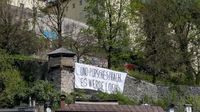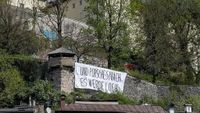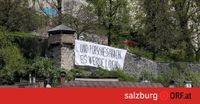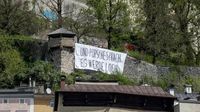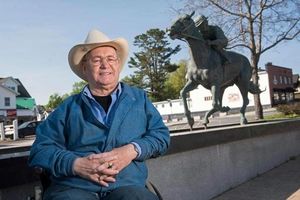Salzburg has become the focal point of a heated protest against a proposed private tunnel for billionaire Wolfgang Porsche, set to connect his villa on the picturesque Kapuzinerberg to the city below. The three-day protest, which began on April 15, 2025, has drawn attention not only for its environmental concerns but also for its implications regarding wealth and privilege in urban planning.
On the second day of the protest, April 16, activists made a bold statement by hanging a massive banner that read "Stoppt den Porsche-Privat-Tunnel" from a historic wall overlooking the city. This banner served as a rallying cry for those opposing the tunnel, which they argue represents a form of "special treatment for the super-rich." The activists have called for a halt to the project and for more transparent governance in city affairs.
The planned tunnel, which is expected to stretch approximately 500 meters from the Linzer Gasse parking garage to Porsche's villa, has sparked significant controversy. Critics argue that the terms under which the project was approved—specifically, a one-time payment of just 40,000 euros for usage rights on public land—are far too lenient given Porsche's immense wealth. The usage rights were granted under the administration of former Mayor Harald Preuner in April 2024, following a deal that many have labeled as lacking transparency.
Current Mayor Bernhard Auinger, who succeeded Preuner, commissioned an expert opinion that confirmed the appropriateness of the fee. However, this has done little to quell the dissent. "Our city is not a construction site for the super-rich. Kapuzinerberg should remain car-free," read the flyers distributed by protestors, highlighting their desire for public spaces to remain accessible to all.
As the protests unfolded, the Green Party in Salzburg voiced strong opposition to the tunnel project, with Ingeborg Haller, the party's leader, questioning the rationale behind granting permanent private access to public space. "Is it really in the city's interest to allow someone to build a private tunnel, excluding others from its use?" she asked, echoing concerns shared by many in the community.
In a unique twist, the protest has been creatively branded as the "Salzburger Porsche-Tunnel-Festspiele," featuring various events and discussions aimed at drawing attention to the issue. Activists, including Tobi Rosswog, have organized a series of performances and public discussions around the theme of wealth inequality and environmental sustainability, inviting community members to engage in the conversation.
The protests have not been limited to Salzburg alone. A related demonstration is planned for April 17, 2025, in Stuttgart, where Porsche's corporate headquarters is located. This cross-border solidarity underscores the widespread concern over the implications of the tunnel project.
Historically, the Kapuzinerberg has been a site of cultural significance, once home to notable figures such as the author Stefan Zweig. The proposed tunnel's construction would not only alter the landscape but also potentially disrupt the historical essence of the area.
Despite the ongoing protests, the Salzburg City Council has yet to make a final decision on the amendment to the land use plan necessary for the tunnel's construction. A vote is expected on May 14, 2025, which will determine whether the project can proceed. Until then, activists remain vigilant, prepared to escalate their efforts if necessary.
As the debate rages on, many in Salzburg are left wondering about the balance between private interests and public good. The upcoming council decision will not only affect the future of the tunnel but may also set a precedent for how urban development is managed in a city that prides itself on its rich history and cultural heritage.
With tensions high and community voices growing louder, the outcome of this dispute will likely resonate far beyond the city limits, serving as a case study in the ongoing struggle between wealth and civic responsibility.
